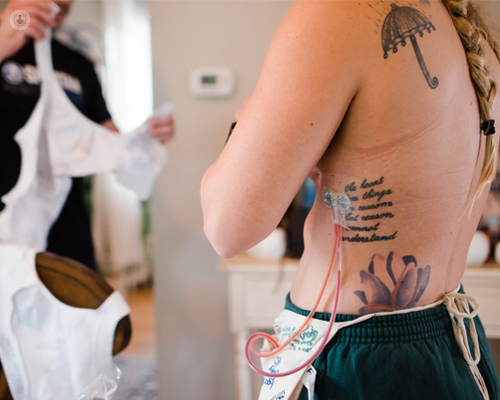Recovery do's and don'ts: breast surgery
Autore:In a previous article, revered consultant general and oncoplastic breast surgeon, Miss Fiona MacNeill, explained the numerous types of breast surgeries that are carried out and when they are required. Now, the London-based surgeon outlines the road to recovery following breast surgery and answers some of the most common questions she gets asked; “Is it painful? How long will recovery take? What should I do and avoid doing?”

Will I be in pain after breast surgery?
The most commonly asked question that I get asked as a surgeon is; will breast surgery be painful? I always say no, but nobody ever believes me. As a matter of fact, breast surgery isn’t particularly painful. It takes place on the surface and doesn’t entail delving deep inside the body. You're not going into the thoracic chest cavity or the abdomen, and you're not cutting muscle or cutting bone which is painful to recover from.
It is all surface surgery so generally it's not particularly painful and that's why so often it can be conducted as day case surgery or requires just a one-night stay in hospital. It doesn’t require lots of complicated pain-killing drugs such as morphine. Most women who have breast surgery might just require a very small dose of morphine or codeine and then just simple painkillers like paracetamol and neurofen so generally fairly straightforward.
It also depends on the type of procedure, if you're having your breast removed and you're having reconstructive surgery you're going to need more pain relief but even after a major surgery like removal of the breast and reconstruction, it's surprising how little pain relief is required.
We also use a lot of local anaesthetic at the time of surgery and there's lots of high-quality evidence now to show that if you put local anaesthetic into the wounds at the end of surgery and women wake up comfortable then they don't experience as much pain as women who've not had local anaesthetic. We block all the local nerves and we put it into the skin afterward. No surgery can be carried out without pain but after breast surgery, the pain is very tolerable, surprisingly.
What does recovery look like?
Recovery is more difficult to predict than pain because that depends on numerous factors; the amount of surgery, the patient's personality, any other underlying health problems, and also what they need from their recovery.
For the majority of women who undergo a day-case surgery, the following day they’ll be tired and want to rest for a few days. Usually, they can drive within two or three days after and they might be able to get back to their work within a week or so, and clearly, that does depend on what work they do.
Someone who’s undergone major surgery, like breast removal and reconstruction may need to take up to three months off work and won’t be back driving for six to eight weeks. It varies greatly on the patient’s lifestyle but it’s an important and commonly-asked question.
It is personality-dependent as well. Some people suffer more from the surgery side effects than others and this can be difficult to predict. However, we’re very good not at managing the pain and we’re good at anticipating who may require additional support. It varies greatly from patient to patient, but it’s an important and commonly-asked question.
What should people do, and avoid doing, after breast surgery?
I normally recommend a couple of days of rest, taking it easy at home but not necessarily bedbound. Sleep is very important to let your body recover, so perhaps a nap in the afternoon or go to bed early to ensure you get enough sleep. Allow yourself to recover. We live such busy lives that if we sit still for a moment, we are plagued with a guilty feeling, but you shouldn’t feel guilty. Sit down, relax, and take it easy.
Although you want to get the balance right between resting and activity because one of the post-surgery risks is deep vein thrombosis, which happens if you sit still for too long. You should avoid doing vigorous exercises, like gym work or jogging, because it might result in more pain, bleeding, and bruising. Avoid strenuous exercise for a couple of weeks, but your surgeon will give you specific advice depending on the nature of your surgery.
Women commonly ask me whether they should wear a bra or not after surgery, and if so, are specifically fitted bras needed. It is a personal decision; bras aren’t medical devices, but rather items of clothing. Some women, particularly heavy-breasted women feel much more comfortable wearing a bra, while women with smaller breasts actually find them very constrictive and uncomfortable.
However, if a woman has had major surgery sometimes wearing a soft bra can be helpful, particularly in bed at night as it supports the breasts and that helps with pain. I normally advise women not to spend a lot of money on expensive, post-surgery bras, that they will only wear them for a few weeks. Some women do find them helpful, but I would recommend nursing bras from high-street stores which are relatively-good value. Similarly, sports bras are good, particularly those that can be done up at the front. Following surgery, it can be difficult to fasten a bra at the back, so finding one you can close at the front is much easier.
There are plenty of websites with more specific advice, a lot of women have access to their breast care nurses in their hospital, and there are numerous charities, like Breast Cancer Now, that offer online advice.
Miss Fiona MacNeill is a highly-experienced breast surgeon practising in London. To book a consultation with the esteemed consultant oncoplastic breast surgeon, visit Miss MacNeill’s Top Doctors profile today.


